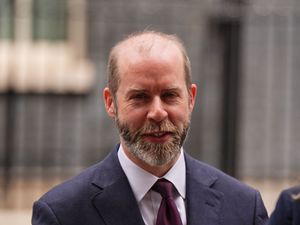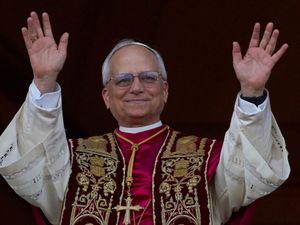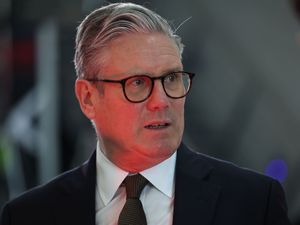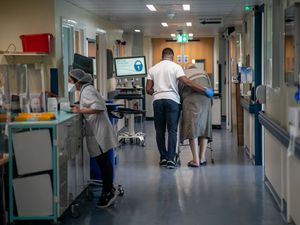Russia’s troops withdrawing and risk being attacked by Ukraine forces – Radakin
The Chief of the Defence Staff said Vladimir Putin was a ‘weaker and more diminished figure today’ than he was before the invasion.
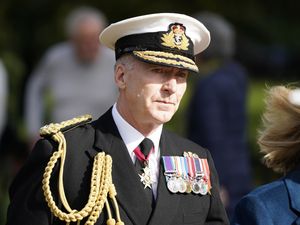
Russia’s bid to take all of Ukraine during its invasion looks to have “fallen apart” as Vladimir Putin’s troops retreat away from Kyiv, the head of Britain’s armed forces has said.
Admiral Sir Tony Radakin said the Russian president had been “misled” about the effectiveness of his country’s armed forces, with “early indications” suggesting Moscow was withdrawing troops – a move that has opened them up to counter attacks by Ukrainian defenders.
In a speech and follow-on question-and-answer session at an Institute for Government (IfG) event, the Chief of the Defence Staff said Mr Putin was a “weaker and more diminished figure today” than he was before the invasion started on February 24.
He announced that the UK was “incredibly cautious” about believing Russian claims of ground troops withdrawing from Kyiv but said there did appear to be signs the Kremlin was preparing to focus its efforts on the east and south of Ukraine.
Sir Tony said: “I think we are seeing that Russia’s ambitions to take Kyiv and Russia’s ambitions to take the whole of Ukraine, and do that in a very swift and impressive fashion, those ambitions have fallen apart.
“And it looks now that less emphasis is being placed on Kyiv and more emphasis is being placed on the east and the south.
“We are starting to see the early indications of those forces being moved back from Kyiv and retreating to both Russia and Belarus.
“That in itself is a difficult evolution for Russia because they are doing that under contact, so Ukraine armed forces will attack those Russian forces as they retreat.”

Sir Tony’s comments come after the Ministry of Defence (MoD), in its latest intelligence assessment, said “significant Russian shelling and missile strikes” had continued around Chernihiv – which lies between Kyiv and Belarus – despite the Kremlin stating it would de-escalate fighting in the area.
The department predicted “heavy fighting” would continue to take place in the Kyiv suburbs in the coming days.
The MoD said that while the city centre of Mariupol, the besieged southern port which has been a key target for Moscow’s forces, remains under Ukrainian control, it is coming under fierce attack.
Following a conference call with defence ministers from more than 35 nations, Defence Secretary Ben Wallace said they had agreed to step up the supply of military equipment to Ukraine.
He said it would include armoured vehicles and artillery ammunition to counter the bombardment of Ukrainian cities by Russian artillery.
During his opening remarks on Thursday, British military chief Sir Tony said the coming weeks would “continue to be very difficult” for Ukraine before adding: “But in many ways, Putin has already lost.
“Far from being the far-sighted manipulator of events that he would have us believe, Putin has damaged himself through a series of catastrophic misjudgments.”
He added: “Like all authoritarians, he allowed himself to be misled as to his own strength, including the effectiveness of the Russian armed forces.
“What is very clear is that Putin is a weaker and more diminished figure today than he was a month ago.
“And, conversely, Nato is stronger and more united today than at any time I can remember.”
Sir Tony, who replaced General Sir Nick Carter in the top job late last year, would not say whether he believed the Russian armed forces was in mutiny.
He instead said there was “disquiet at all levels” of Moscow’s military.

He branded it “insane” and “morally bankrupt” that Russian officers, according to Western intelligence, had led troops into battle without informing them that an invasion had been ordered.
The Kremlin’s plans “haven’t gone well” and that the way senior commanders had prosecuted the invasion “looks to us like it has been very poorly conducted”, Sir Tony added.
The comments echoed what the head of the GCHQ intelligence agency, Sir Jeremy Fleming, had said in a rare public speech, in which he stated that Mr Putin had “overestimated the abilities of his military to secure a rapid victory”.
Sir Jeremy, speaking in Australia, said: “We’ve seen Russian soldiers – short of weapons and morale – refusing to carry out orders, sabotaging their own equipment, and even accidentally shooting down their own aircraft.
“And even though we believe Putin’s advisers are afraid to tell him the truth, what’s going on and the extent of these misjudgments must be crystal clear to the regime.”
Talks between Ukraine and Russia are set to resume on Friday via video, according to the head of the Ukrainian delegation, David Arakhamia.
But Western officials have expressed scepticism about Moscow’s commitment to the peace process.
A source said: “I don’t think we are seeing any signs at the moment that there is a really serious attempt at finding compromise, I’m pretty cautious about the negotiations.
“You have to set the negotiations against the absolutely brutal assault that is continuing against Ukrainian cities.”
Meanwhile, the UK has sanctioned a Russian commander believed to be responsible for the bombardment of Mariupol, with Downing Street suggesting the devastation caused to the city appeared to be a war crime.
Colonel-general Mikhail Mizintsev, dubbed “the butcher of Mariupol”, is the chief of Russia’s national defence command and control centre, where all military operations are planned.
The Prime Minister’s official spokesman said there “appears to be evidence of war crimes” but it was not for Britain to rule on that.
Along with the military commander, the UK sanctioned a range of Russian media outlets and presenters blamed for spreading the Kremlin’s propaganda.

